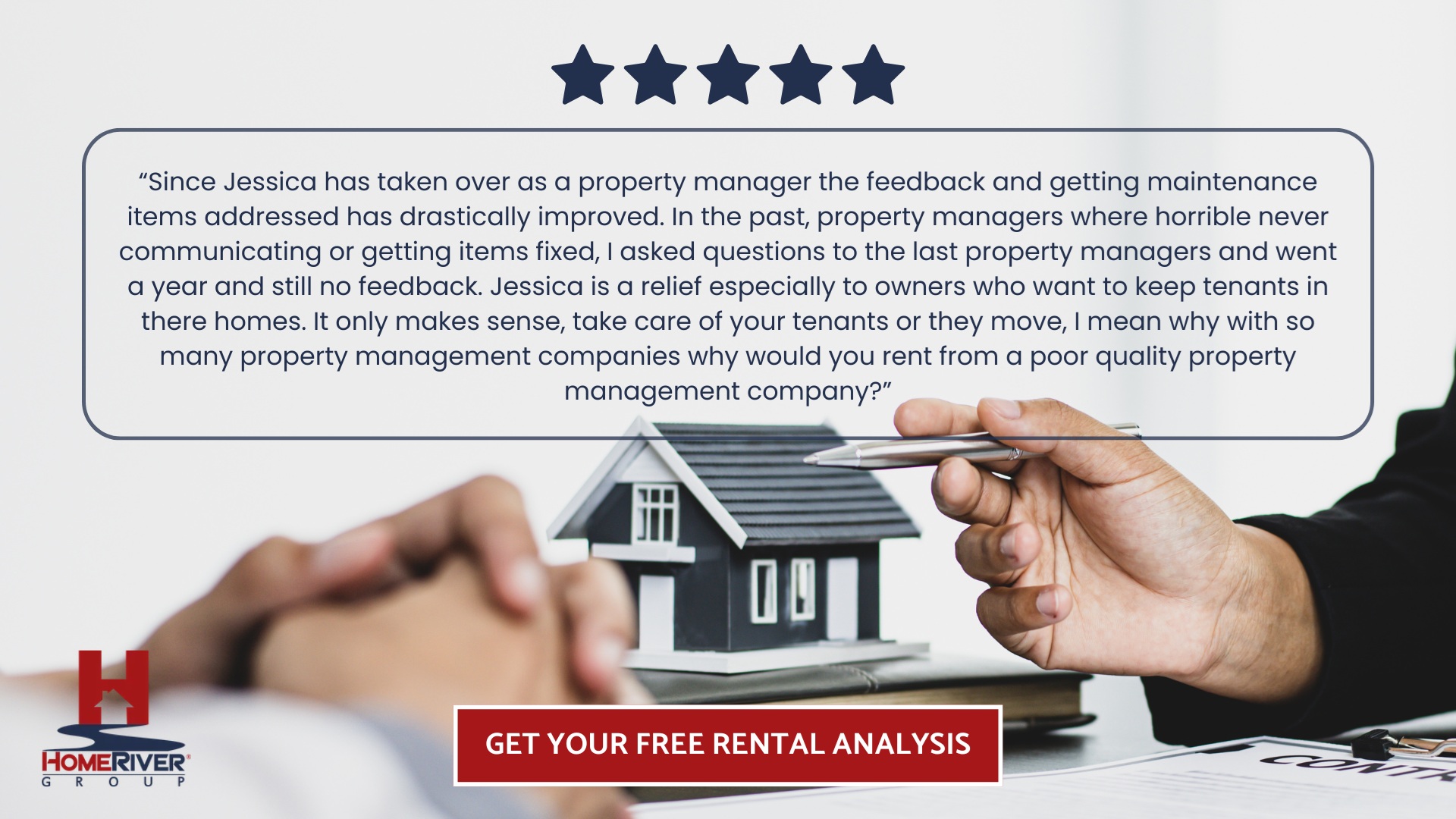
At HomeRiver Group, we manage over 40,000 homes across more than 60 U.S. markets—and we do it with precision. Our unmatched scale, local expertise, and advanced systems empower investors to maximize returns while minimizing hassle. From single-family homes to multifamily units, we deliver seamless, professional service tailored to your goals. When you partner with us, you're backed by a national leader who knows property management inside and out.
Managing a rental property means more than collecting rent—it’s about understanding every dollar that goes in and out. Whether you're new to the game or a seasoned investor, having a clear grasp of what to track can make or break your bottom line. From recurring costs to unexpected repairs, your planning ability starts with clarity. A well-organized rental property expenses list is the first step toward stronger financial control and more intelligent decisions.
This article will explore the essential categories of rental property expenses every landlord should track, how to organize them for maximum clarity, and why accurate financial oversight is key to long-term investment success.
Types Of Rental Property Expenses
Navigating property management means understanding the varied expenses of owning a rental property. Tracking these costs diligently helps with budgeting, ensures accurate financial reporting, and maximizes the return on your investment.
Here’s a breakdown of the main types of rental property expenses every landlord should track:
These are recurring costs necessary to keep your property running smoothly daily. Typical operating expenses include:
Property Management Fees: Charges for professional management services.
Utilities: Water, sewer, gas, electricity, trash removal if not tenant-paid.
Repairs and Maintenance: Routine upkeep, landscaping, pest control, and emergency repairs.
Insurance: Landlord and hazard insurance premiums.
Landlords are responsible for several tax-related expenditures that can impact cash flow:
Property Taxes: Annual or semi-annual taxes assessed by local governments.
Licensing Fees: Costs for required rental permits or business licenses.
HOA Dues: Fees if your property is part of a homeowners association.
If the property is financed, these expenses are predictable but significant:
Mortgage Payments: Principal and interest on property loans.
Loan Servicing Fees: Charges from your lender for managing your loan.
Accurately accounting for these costs is key when estimating rental property cash flow and forecasting profitability.
Every landlord experiences gaps between tenants, which generate their own expenses:
Lost Rental Income: Periods when the property sits unoccupied.
Marketing and Advertising: Costs to list and promote your rental.
Tenant Screening: Background and credit check fees.
These are larger, infrequent investments that improve or extend the life of your property:
Major Renovations: Roof replacement, HVAC systems, appliances.
Improvements: Upgrades to boost property value or attract quality tenants.
Documenting expenses in these categories will help landlords optimize operations, remain compliant with tax regulations, and make more strategic investment decisions.
Fixed vs. Variable Expenses
Understanding the difference between fixed and variable expenses is crucial for managing a rental property, as it allows one to maintain profitability and make informed decisions.
Fixed Expenses
Fixed expenses are predictable costs that remain consistent month after month, regardless of property occupancy or tenant turnover. These typically include mortgage payments, property taxes, insurance premiums, and homeowners association (HOA) fees. Because they're consistent, fixed expenses simplify budgeting and planning for the long term.
Variable Expenses
On the other hand, variable expenses fluctuate based on actual events or needs throughout the year. These include repairs, maintenance, utilities (when not paid by tenants), landscaping, pest control, and unexpected costs such as emergency plumbing or HVAC fixes. Variable expenses can be unpredictable and may spike without warning, so setting aside a reserve fund is wise.
A clear breakdown between fixed and variable costs will help track your rental property expenses more accurately and provide insight into where cost-saving opportunities may exist. With a well-organized list of expenses for rental property, you can anticipate cash flow, allocate resources intelligently, and minimize unpleasant financial surprises.
Common Operating Expenses For Rental Properties
Managing a rental property requires a clear understanding of the regular costs that keep the business running smoothly.
Below are the most common operating expenses every property owner should track to protect their investment and maximize returns:
Property Taxes: Local governments assess property taxes annually, and they can fluctuate from year to year. Staying on top of these payments is crucial to avoid penalties and legal issues.
Insurance Premiums: Landlord insurance covers everything from property damage to liability claims. Premiums can vary based on location, property type, and the level of coverage chosen.
Maintenance and Repairs: Routine maintenance—like lawn care, gutter cleaning, and seasonal inspections—helps prevent costly repairs. Unexpected fixes, such as plumbing leaks or broken appliances, are inevitable and should be factored into your budget.
Utilities: If you provide water, electricity, or gas as part of the rental agreement, these become a consistent operational cost. Even if tenants pay their utilities, you must account for communal area lighting or sprinkler systems.
Property Management Fees: Property management fees are a predictable expense for landlords who outsource day-to-day operations. These typically cover rent collection, tenant communication, maintenance coordination, and handling emergencies. Understanding what is included in property management fees can help you evaluate the value and scope of your management agreement.
Advertising and Leasing Fees: Finding quality tenants requires investment in advertising, background checks, and sometimes professional photography or staging. Leasing fees may also apply when a property manager secures a new tenant.
Homeowners Association (HOA) Dues: If your property is located within an HOA, monthly or annual dues cover shared amenities and neighborhood maintenance. Ignoring these can lead to significant fines.
Legal and Accounting Costs: Consulting legal and tax professionals helps ensure compliance with complex tenant laws and tax regulations. These expenses are essential for accurate bookkeeping and avoiding costly legal disputes.
By tracking these everyday operating expenses, landlords gain clearer insight into their rental properties' true profitability and are better equipped to make informed financial decisions.
Record-Keeping And Accounting Methods
Maintaining meticulous records is essential for any landlord aiming to maximize profits, streamline tax preparation, and comply with local regulations. Choosing the right record-keeping and accounting methods benefits your bottom line and gives you the clarity to make well-informed decisions about your rental property.
Manual vs. Digital Systems
There are two main approaches to accounting: manual and digital systems. Traditionalists may opt for spreadsheets or even handwritten ledgers to track expenses by hand. While this method can work for small portfolios, the risk of errors and data loss increases as holdings grow.
Digital accounting software, on the other hand, automates much of the process. Modern platforms offer features like bank feed integration, receipt scanning, and real-time reporting, making it easier to categorize and retrieve expenses with a few clicks. Utilizing cloud-based systems can also provide secure backup and multi-device accessibility.
Categorizing Expenses
Organizing your expenses ensures that every deductible is accounted for during tax season. Typical categories include mortgage interest, repairs and maintenance, property management fees, insurance, utilities, advertising, legal fees, and travel costs related to the property. Assigning each expense to the correct category at the time of entry minimizes confusion and saves significant time later.
Retaining Documentation
It’s not enough to know what you’ve spent—you’ll also need to keep supporting documents for each transaction. Save receipts, invoices, bank statements, and contractor agreements. The IRS recommends holding onto these records for at least seven years. Digital copies are acceptable, so consider scanning paper documents into your accounting system or cloud storage to reduce clutter and preserve files.
Regular Reviews
Consistency is key. Set a schedule—monthly or quarterly—to review your financial records. Regular audits help catch mistakes, monitor cash flow, and identify areas to cut costs or boost value. It also makes year-end reporting and tax preparation a much less daunting task.
By implementing a reliable record-keeping and accounting strategy, landlords can build a solid financial foundation and respond efficiently to audits or compliance requests.
Tax Deductions For Rental Property Expenses
Understanding which rental property expenses are tax-deductible can significantly improve your bottom line. Savvy landlords track every eligible expense, maximizing their returns and staying compliant with tax regulations.
Here’s a look at key expenses you should never overlook when it comes time to file your taxes:
Mortgage Interest: One of the largest deductions for most landlords, interest on your rental property loan can be subtracted from your taxable income.
Property Taxes: Annual property taxes are fully deductible, reducing your tax burden.
Repairs and Maintenance: Expenses that restore or maintain your property’s condition, such as fixing a leaky roof or repainting walls, are generally tax-deductible in the year incurred.
Insurance Premiums: Premiums for landlord insurance, liability coverage, or flood insurance can be claimed as deductible expenses.
Utilities: If you cover utilities like water, electricity, or trash for your tenants, you can deduct these costs.
Property Management Fees: These fees typically cover rent collection, tenant communication, and handling maintenance requests. Many landlords also ask: Are property management fees tax-deductible? In most cases, yes—they are considered a business expense, but it's essential to consult a tax professional for proper classification.
Travel Expenses: If properly documented, travel expenses related to managing your rental, including mileage or public transit fares to and from the property, can be deducted.
Depreciation: The IRS allows you to recover the cost of your rental property over a period of time, typically 27.5 years. This non-cash deduction can significantly lower your taxable income.
Keeping organized records and itemized receipts for each expense is vital. Accurate documentation ensures you can support your deductions if your returns are ever audited, giving you a clearer view of your property’s true profitability each year.
Final Thoughts
A comprehensive list of rental property expenses is essential in real estate investment. For landlords, meticulous expense tracking ensures they maintain the profitability of their investment while navigating the complexities of tax compliance and financial planning. Each line item is vital to your property's financial story, from routine maintenance and emergency repairs to insurance, legal fees, and beyond.
At HomeRiver Group, exceptional service paired with local expertise sets successful landlords apart. Leveraging detailed expense tracking and clear documentation creates a foundation for smarter decisions, greater asset protection, and smoother property management.
By mastering your rental property expenses list, you’re taking the correct steps to maximize ROI and minimize surprises, ensuring your venture remains rewarding and sustainable in the long run. Managing your property’s bottom line has never been easier with the right partner.
Read also:
Insuring A Rental Property: What Every Landlord Needs To Know
What Is A Good Cap Rate For Rental Property? A Guide For Investors
Frequently Asked Questions About Rental Property Expenses List
Can landlords deduct property tax as a rental expense?
Yes. Property taxes paid on rental property are deductible expenses. Landlords can report these costs on tax returns, reducing taxable rental income.
Are utilities considered a deductible expense for landlords?
Absolutely. If you, as the landlord, pay for utilities like water, gas, electricity, trash collection, or sewer for your rental property, those costs are deductible rental expenses. If tenants reimburse you for utilities, only the portion you pay can be deducted.
What kinds of repairs count as deductible expenses for rental property?
Any repairs made to maintain your rental property in good working condition, such as fixing leaks, patching holes, repairing broken appliances, or repainting walls, are generally deductible. Improvements that add value or extend the property’s life must be depreciated.
Can landlords deduct the cost of hiring a property management company?
Yes. Fees paid to a property management company like HomeRiver Group are fully deductible business expenses. This includes leasing fees, tenant placement fees, and any other management costs.
What insurance costs can landlords write off?
Premiums for landlord-specific insurance policies, such as property, liability, or flood insurance, are deductible rental property expenses. These write-offs help offset your total rental income at tax time.
How do landlords track depreciation on rental property?
Depreciation is tracked by spreading your investment in the property (excluding land value) over a set number of years, usually 27.5 for residential property. This is calculated annually and must be reported on IRS Form 4562. Consulting an accountant or property management professional can help ensure you maximize this benefit.
Is mortgage interest a deductible rental property expense?
Yes. The interest portion of your mortgage payments on your rental property can be deducted as a rental expense. For most landlords, this is a significant annual deduction.
What are common maintenance expenses for rental properties?
Typical maintenance expenses include lawn care, snow removal, pest control, HVAC servicing, cleaning between tenants, and general upkeep like plumbing repairs and lock replacements. Keeping thorough records of these costs is essential for maximizing your tax deductions.











